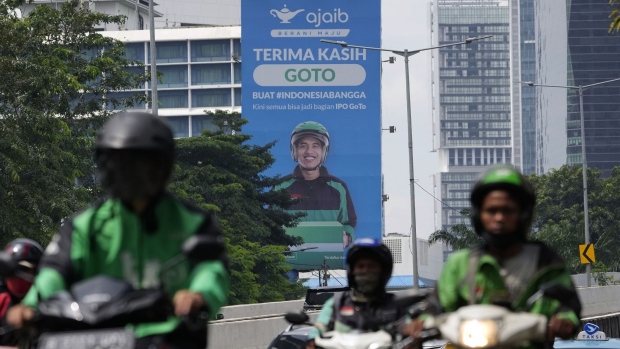Nov 30, 2022
GoTo Plumbs New Low After Early Backers’ Lock-Up Expires
, Bloomberg News

(Bloomberg) -- Shares of GoTo Group plunged to yet another record low after a lock-up on its major shareholders’ stakes expired, freeing early backers to reduce their holdings.
The stock fell by 6.6%, close to the daily limit in Jakarta, and headed for its ninth straight daily drop, leaving it down 58% since its April debut. Indonesia’s largest tech company now has a market value of about $10.7 billion.
Early backers such as Alibaba Group Holding Ltd. and SoftBank Group Corp. agreed to an eight-month lock-up expiring Nov. 30 to support the stock price following the company’s initial public offering. GoTo’s plan to facilitate controlled stake sales by pre-IPO backers -- aimed at avoiding a bigger selloff at once -- didn’t come to fruition, the company said late Wednesday.
The shareholders that had considered selling have decided not to proceed at this time, GoTo said. The holders and potential buyers involved in the discussions haven’t agreed on a price, people familiar with the matter said. Some holders GoTo has been in talks with are inclined to wait for a recovery in the stock price before selling, the people said.
Falling prices of tech stocks made it difficult to arrange the sale, with potential new investors asking for a discount of as much as 30% to the Indonesian internet company’s current share price, said one of the people, who asked not to be named as the deliberations were private.
About 1 trillion GoTo shares, or more than 90% of the total outstanding, became eligible to be sold after Nov. 30. Still, that includes holders such as GoTo’s employee fund that are unlikely to sell. Alibaba and SoftBank each own about 9% of GoTo.
Formed via a merger of ride-hailing provider Gojek and e-commerce firm Tokopedia, GoTo raised $1.1 billion in one of this year’s largest IPOs. The share sale boosted the value of stakes of China’s Alibaba and SoftBank’s Vision Fund to almost $5 billion combined.
In late June, Chinese artificial intelligence software maker SenseTime Group Inc. slumped as much as 51% in Hong Kong trading after a lock-up of its shares expired following its December IPO.
©2022 Bloomberg L.P.





